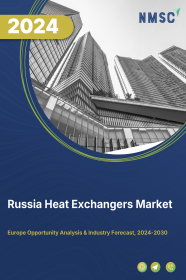
Russia Heat Exchangers Market by Type (Shell & Tube, Plate & Frame, Air Cooled, and Others), by Material (Metals, Alloys, and Brazing-CLAD), and by End User (Chemical, Energy & Power, Heating, Ventilation, Air Conditioning, and Refrigeration (HVACR), Food & Beverage, Pulp & Paper, and Others)– Opportunity Analysis and Industry Forecast, 2024–2030
Industry: Retail and Consumer | Publish Date: 04-Dec-2024 | No of Pages: 118 | No. of Tables: 86 | No. of Figures: 51 | Format: PDF | Report Code : RC1558
US Tariff Impact on Russia Heat Exchangers Market
Trump Tariffs Are Reshaping Global Business
Market Overview
The Russia Heat Exchangers Market size was valued at USD 352.4 million in 2023, and is predicted to reach USD 473.9 million by 2030, with a CAGR of 3.7% from 2024 to 2030.
Heat exchangers, devised to transfer heat between fluids without direct contact, are extensively utilized in industrial, commercial, and residential settings, including HVAC systems and refrigeration units, to efficiently heat or cool fluids or air. Functioning by enabling heat to traverse a barrier, including a solid wall or an array of plates or tubes, they can perform tasks such as heating water in boilers or cooling air in air conditioning systems. Available in various designs tailored to specific requirements, ranging from simple radiator coils to complex systems found in chemical processing plants and power generation facilities, they play vital roles across multiple industries and applications.
These roles include regulating air temperature in buildings, facilitating steam production in power plants, controlling temperatures during chemical reactions, and aiding in food processing, among others. Additionally, they are essential components in automotive cooling systems and find widespread applications in aerospace, marine, and wastewater treatment industries, playing a crucial role in efficient thermal management and energy transfer.
Growing Demand for Renewable Energy Drives Russia’s Market Expansion
The growing demand for renewable energy is a driving force behind Russia's market expansion. With increasing emphasis on sustainability and reducing carbon emissions, there's a notable shift towards renewable energy sources in Russia.
This transition creates a significant market opportunity for technologies including heat exchangers, which play a crucial role in renewable energy systems such as solar thermal and geothermal power generation. As the country seeks to diversify its energy mix and meet sustainability goals, the demand for heat exchangers for renewable energy applications is expected to grow, driving market expansion in Russia.
Growing Industrialization and Urbanization in Russia Drive Market Growth
The growth of industrialization and urbanization in Russia is a key driver of market growth. As urban areas expand and industrial sectors develop, there is a rising demand for various infrastructure and services, including heating, ventilation, and air conditioning (HVAC) systems. Heat exchangers play a vital role in these systems, facilitating efficient heat transfer for both commercial and residential buildings.
Additionally, in industrial settings, heat exchangers are essential for processes such as power generation, chemical production, and manufacturing. With the increasing need for these applications, driven by industrialization and urbanization trends, the demand for heat exchangers is expected to rise, thereby driving market growth in Russia.
High Installation and Maintenance Costs Restrain Market Growth
The high costs associated with installation and maintenance pose a challenge to market expansion. Although heat exchangers provide effective solutions for heat transfer, the initial investment and ongoing maintenance expenses can be significant. This financial burden often dissuades businesses, especially those with limited financial resources, from embracing heat exchangers technologies.
Moreover, despite the potential long-term savings from energy-efficient heat exchangers, the need for regular maintenance and operational costs, such as cleaning and repairs, further escalates the overall ownership expenses. Consequently, the perceived financial barrier stemming from high installation and maintenance costs hinders the widespread adoption of heat exchangers, thereby limiting market growth within specific sectors.
Integration with Renewable Energy Systems Creates a Market Opportunity
Integration with renewable energy systems presents a promising market opportunity. As the global shift towards sustainable energy sources accelerates, there is a growing demand for heat exchangers integrated with renewable energy systems such as solar thermal, geothermal, and biomass. These systems rely on heat exchangers to efficiently capture and transfer thermal energy, thus driving the demand for specialized heat exchangers solutions.
Additionally, government incentives and regulations promoting renewable energy adoption further boost market opportunities for heat exchangers. By aligning with renewable energy initiatives, heat exchangers manufacturers can tap into a rapidly expanding market segment and contribute to a more sustainable future.
Competitive Landscape
Several market players operating in Russia’s heat exchangers market include Alfa Laval AB, Johnson Controls International plc, Carrier Global Corporation, Lennox International Inc., Trane Technologies plc, API Heat Transfer Inc., Kelvion Holding GmbH, Xylem Inc., Danfoss Group, and General Electric Company among others. These companies are adopting various strategies such as product launches to remain dominant in the heat exchangers market.
Key Market Segments
By Type
-
Shell & Tube
-
Fixed Tube Heat Exchangers
-
U-Tube Heat Exchangers
-
Floating Head Heat Exchangers
-
Other Shell & Tube Heat Exchangers
-
-
Plate & Frame Heat Exchangers
-
Gasketed Plate & Frame Heat Exchangers
-
Welded Plate & Frame Heat Exchangers
-
Brazed Plate & Frame Heat Exchangers
-
Other Plate & Frame Heat Exchangers
-
-
Air Cooled
-
Forced Draft Heat Exchangers
-
Induced Draft Heat Exchangers
-
-
Others
By Materials
-
Metals
-
Alloys
-
Brazing-CLAD
By End User
-
Chemical
-
Energy & Power
-
HVACR
-
Food & Beverage
-
Pulp & Paper
-
Others
Key Players
-
Alfa Laval AB
-
Johnson Controls International plc
-
Carrier Global Corporation
-
Lennox International Inc.
-
Trane Technologies plc
-
API Heat Transfer Inc.
-
Kelvion Holding GmbH
-
Xylem Inc.
-
Danfoss Group
-
General Electric Company
REPORT SCOPE AND SEGMENTATION:
|
Parameters |
Details |
|
Market Size in 2023 |
USD 352.4 Million |
|
Revenue Forecast in 2030 |
USD 473.9 Million |
|
Growth Rate |
CAGR of % from 2024 to 2030 |
|
Analysis Period |
2023–2030 |
|
Base Year Considered |
2023 |
|
Forecast Period |
2024–2030 |
|
Market Size Estimation |
Million (USD) |
|
Growth Factors |
|
|
Companies Profiled |
10 |
|
Market Share |
Available for 10 companies |
|
Customization Scope |
Free customization (equivalent up to 80 working hours of analysts) after purchase. Addition or alteration to country, regional, and segment scope. |
|
Pricing and Purchase Options |
Avail customized purchase options to meet your exact research needs. |

















 Speak to Our Analyst
Speak to Our Analyst





















